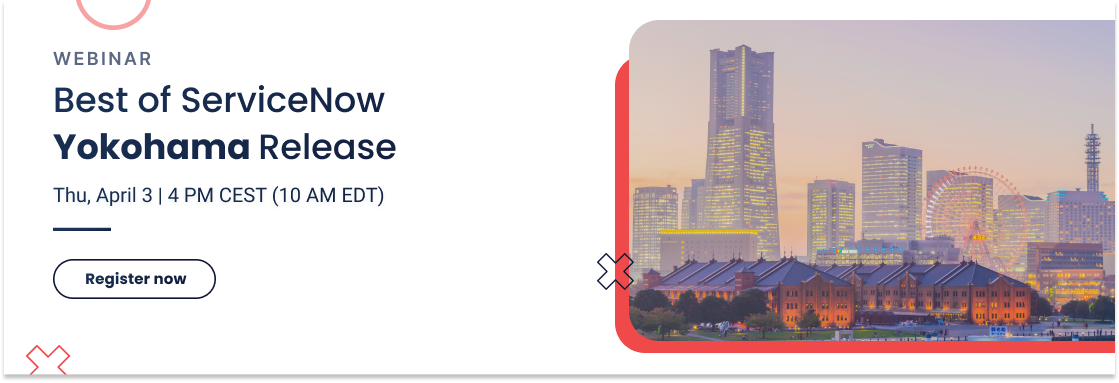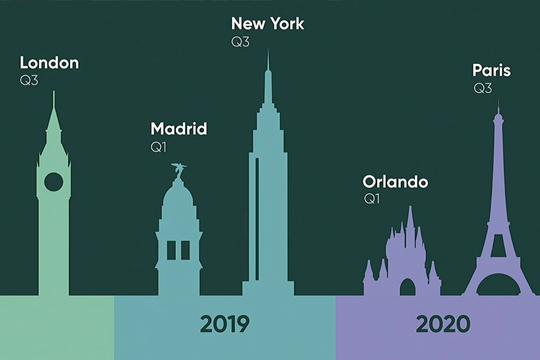All you need to know about ServiceNow releases
Quickly jump to:
- What are ServiceNow releases?
- How often does ServiceNow make releases available?
- Do I need to upgrade my instances with every new feature release?
- What is the next ServiceNow release?
- How do I get a new ServiceNow release?
- What is the latest ServiceNow release?
- Where can I find ServiceNow release notes?
- Why do I need ServiceNow release notes?
- How do I upgrade my current version to the new ServiceNow release?
- Overview of all ServiceNow releases
What are ServiceNow releases?
ServiceNow releases are twice yearly version upgrades. Intended to improve the overall performance of the platform, the upgrades also typically include new modules, applications or enhancements, as well as fixes for existing products. All releases are named after a city.
Upgrading your instance to a new release requires planning, testing and validation. In fact, system upgrades can be significant projects. Each ServiceNow feature release includes major additions, so you should always consider the impact of a new functionality on an instance.

Upgrading involves implementing enhancements to all features that are part of the base system, or are already active, unless the feature is customized on your instance.
How often does ServiceNow make releases available?
ServiceNow has a strong history of delivering updates to ensure maximum performance and improve functionalities. Since the Kingston release in Q1 2019, ServiceNow plans two feature releases per year in two non-consecutive quarters.
In between these feature releases ServiceNow provides patch releases with a collection of all known problem fixes to date that are eventually automatically deployed to customer instance.
Do I need to upgrade my instances with every new feature release?
ServiceNow supports the current and previous release. Your instances will continue to function if you choose not to upgrade with the latest release, but this means that ServiceNow cannot guarantee the performance or safety of your systems.
Will I be part of the Patching Program if I am on an unsupported release family?
The Patching Program does not schedule patches on unsupported release families. ServiceNow offers product support for supported release families only.
Can I stay on an unsupported release family, knowing the risks?
No. You must upgrade your instances to supported versions in order to get the latest security, performance, and availability updates.
What is the next ServiceNow release?
The next ServiceNow release, Yokohama, is scheduled to be released publicly in Q1 2025.
How do I get a new ServiceNow release?
All ServiceNow releases are part and parcel of the ServiceNow subscription or licensing agreement. ServiceNow plans release dates up to three years ahead and notifies clients on the exact release dates upfront.
Upgrading typically takes weeks if well prepared beforehand and when using ServiceNow’s prescriptive guidance and best practices.
Can ServiceNow releases be purchased in the ServiceNow store?
Releases are free, as they are part of any ServiceNow subscription or licensing agreement.
The ServiceNow store is the place to go for both paid and free applications and integrations developed and deployed on the ServiceNow platform. The store is dedicated to the promotion of cloud‑native enterprise applications developed by 3rd party ISVs, solution providers, system integrators and service providers.
With over 300 apps in the store, it’s an important channel for ServiceNow users.
What is the latest ServiceNow release?
As previously mentioned, ServiceNow releases two new versions per year. The current Xanadu release was delivered in Q3 2024. Prior to Xanadu were the Washington release in Q1 2024 and Vancouver and Utah releases of 2023. ServiceNow’s next release, Yokohama, is planned for early 2025.
The ServiceNow Xanadu release
The Xanadu release boasts many new features to ServiceNow products related to Workplace efficiency, Operational Technology/Manufacturing, App Development and HR Service Delivery
Some noteworthy features from the Vancouver release include:
- Reservation & Space Management Planner
Retention of workplace services avoids double work. The event planner in Reservation Management now includes retention of workplace services when dragging and dropping reservations between locations. This avoids double work for facility agents who are managing cases.
- Real-time data analytics and monitoring tools
The Xanadu release introduces powerful real-time analytics tools that are integrated into the Operational Technology Progress Scorecard. This feature allows manufacturing managers to compare sites by key metrics and make informed decisions based on live data.
- Enhanced automation functions for Creator Studio
The Xanadu release introduces significant advancements in Creator Studio, especially for playbook-related functions. The name playbooks—formerly known as ‘processes’—has been introduced to emphasize that playbooks guide users through structured interactive processes, providing a clear path and ensuring that all necessary steps are followed. You can create playbooks for any (custom) process.
Did any of these new features spark your interest? Read a more extensive report on Xanadu’s highlights here or watch our 45-minute webinar on Xanadu’s hidden gems.
Where can I find ServiceNow release notes?
Proper planning, testing, and validation are the basis for any successful release upgrade. The release notes guide you through completing all the phases and tasks of an upgrade.
The release notes for Xanadu are published on the ServiceNow site, as are the notes for all previous releases.
Why do I need ServiceNow release notes?
Before embarking on the upgrade process, be sure to read the Xanadu release notes and review the upgrade and migration tasks for your applications and features.
The ServiceNow release notes are the go-to place for:
✓ Release highlights – Know what you’re getting
Review the release highlights to learn about new features and enhancements in Xanadu. You can also find the release notes that correspond to your particular upgrade path.
Each of the release notes packages includes tools to inform you on the next steps in your upgrade, including:
- Release highlights
- Features and changes by product, which are pre-combined for cross-family upgrades
- Changes to plugins
- Personalized PRB release notes
- Available patches and hotfixes
- Browser support
- Accessibility and compliance
✓ Best practices – Checklists to a successful upgrade
Start preparing for your upgrade with the upgrade planning checklist based on best practices.
To help ensure that you complete all the tasks for a successful upgrade, follow the step-by-step instructions in the upgrade planning checklist to track and plan the upgrade.
✓ Guidance – Get started with your upgrade
Upgrading your instance involves planning, testing, and validation. The release notes guide you through completing all of the phases and tasks for a successful upgrade.

How do I know what my current ServiceNow release is?
If you’re not quite sure what release is running on any one of your instances, you can check this when you go to the ServiceNow Support page.
How do I upgrade my current version to the new ServiceNow release?
Basically, upgrading to any new ServiceNow release involves answering the following 3 questions:
1. What has changed in the new release and what have you changed in your instance since the last release update?
Assess the impact of the new release on your existing functionalities:
- Check past experiences & history
- Review what has changed in the new release
- Use the Upgrade Preview module to see impact on current configurations and help estimate time needed for the upgrade
- Contribute to common findings register and make them reusable for other upgrades
2. Have you got a plan of action in place to ensure you’ve covered all feature changes?
Prepare a release schedule and make a resource plan:
- Make a calendar view with dates and hours and identify number of resources required and their availability
- Define and assign upgrade responsibilities
- Use the Upgrade monitor to review past experiences to know what to fix and what to ignore and plan time for tackling defects and bug fixing
- to ensure any urgent development work is rounded off before the development freeze period
3. How can you validate that what you have upgraded works when going live?
Prepare test plan & scripts
- Re-evaluate your resource plan based on:
- What to test
- How much to test
- How many resources are needed to test
- List all critical functionalities and assign resources and hours for additional time to build and testing
- Plan high-level testing for other non-critical functionalities
- Carry our portal quality check to make sure your users are getting the experience you have in mind
How will upgrading to the latest ServiceNow release impact my operations?
Any release upgrade requires planning and resources to make sure that all features work to the max and system security is guaranteed once the upgrade has been completed. This will impact any current projects that you have running, as well as requiring people to become owners of upgrade actions.
Importantly, we’ve seen release upgrades are most successfully implemented if current IT projects are completed or temporarily halted so that full focus can be given to the ServiceNow release.
![]()
✓ Resources
When upgrading on same instance where project is being executed, we recommend a development freeze.
![]()
✓ Clear actions and owners
Not all people are experts in upgrades, always check to you have the right people fitting the right task. Provide them with a clear action list and assign single owners to actions. Multiple owners for one action causes ambiguity.
![]()
✓ Selecting instances
When requesting a cloned instance to test upgrade, consider the impact to testing components such as integrations, and reapplying fixes to original the dev instance.
![]()
✓ Resuming projects
Ask yourself what is required post-upgrade to resume original projects. How do you realign your people and resources? And will you be needing additional people to fulfil your plans on time?
Overview of all ServiceNow releases
Release names and highlights:
| Release name | Date |
| Aspen | 2011 |
| Berlin | Q3 – 2012 |
| Calgary | Q2 – 2013 |
| Dublin | Q4 – 2013 |
| Eureka | Q2 – 2014 |
| Fuji | Q1 – 2015 |
| Geneva | Q4 – 2015 |
| Helsinki | Q2 – 2016 |
| Kingston | Q4 – 2016 |
| Jakarta | Q2 – 2017 |
| Istanbul | Q4 – 2017 |
| London | Q2 – 2018 |
| Madrid | Q1 – 2019 |
| New York | Q3 – 2019 |
| Orlando | Q1 – 2020 |
| Paris | Q3 – 2020 |
| Quebec | Q1 – 2021 |
| Rome | Q3 – 2021 |
| San Diego | Q2 – 2022 |
| Tokyo | Q4 – 2022 |
| Utah | Q2 – 2023 |
| Vancouver | Q4 – 2023 |
| Washington DC | Q1 – 2024 |
| Xanadu | Q4 – 2024 |
| Yokohama | Q1 – 2025 |
| Zurich | Q4 – 2025 |
Book a free ServiceNow expert call
We can’t wait to help you make work flow with ServiceNow! Fill out the form below, and we will get you in touch with the right ServiceNow expert.






